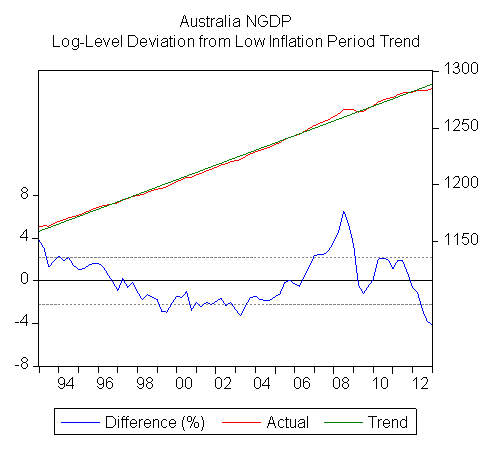Australia as Poster Child for the New Market Monetarism? (March Quarter Edition)
The national accounts were out yesterday, so time to update our graph of the (log) level of nominal GDP relative to its low inflation period trend. The Australian economy still sits 4% below the NGDP level stabilisation benchmark suggested by the new market monetarists, implying that monetary policy has been too tight:

The new market monetarists argue Australia was a poster child for NGDP stabilisation during the financial crisis, but I interpret things differently. Prior to the onset of the financial crisis, inflation was out of control (CPI inflation running at 5%) and nominal GDP growth was running in the double-digits. The financial crisis saved the RBA from having to induce a domestic recession to bring inflation under control. The RBA was most successful when international conditions were doing the work for them.
Lest this look like the luxury of hindsight, I was arguing much the same thing in August 2008.
posted on 06 June 2013 by skirchner
in Economics, Financial Markets, Monetary Policy
(2) Comments | Permalink | Main
|

Comments
I don’t disagree that the RBA mismanaged the boom, but if the GFC got inflation under control without a technical recession, in theory, couldn’t the RBA have orchestrated the same? Either way, I think they’ve done better than most other central banks, perhaps because they had (and still have) the luxury of being further away from the ZLB.
Speaking of NGDP targeting, what are your thoughts on Warwick McKibbin coming out again to reiterate his support for NGDP targeting, but then also reiterating his opposition to further rate cuts despite the below-trend NGDP growth you note above?
Posted by .(JavaScript must be enabled to view this email address) on 06/06 at 05:34 PM
It is possible the RBA could have engineered the same outcome, but the transmission mechanisms would be different and politically more difficult. So much easier when the rest of the world does the adversity for you.
Warwick is very familiar with the early work in the 1990s at Brookings on policy rules and so I think he has long been sympathetic to it in general, but that doesn’t mean he has to be sympathetic to easier policy at this point in time. My guess is his view on the global economy is conditioning his view on Aust at the moment, but you would have to ask him.
Posted by skirchner on 06/07 at 08:37 AM